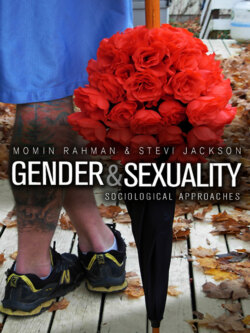Читать книгу Gender and Sexuality - Stevi Jackson - Страница 9
На сайте Литреса книга снята с продажи.
Essentialism in Classical Sociological Thinking
ОглавлениеGender and sexuality received only scant attention within classical sociology and have only recently been established as ‘proper’ topics for sociological inquiry. Most introductory sociology courses and texts now cover gender and sexuality – but this is a relatively recent innovation, occurring over the last couple of decades of the twentieth century. It is useful to consider why it took so long for gender and sexuality to be included within what C. Wright Mills calls the ‘sociological imagination’ (Mills, 1959). Part of the reasons for this absence relates to the lack of ‘presence’ of both women and those of diverse sexualities in academia. A similar lack of ethnic and racial minority presence has often led to oversights on issues of racism, colonialism and post- colonialism. In both the UK and North America, these issues of race, gender and sexuality are more visible now in part because there is greater diversity in academia itself. It is important to note that much of the work around gender and sexuality has been driven by an attempt to understand personal experience in a sociological way. Indeed, both your authors have contributed to research on gender and sexuality largely because our personal identities and experiences have made us all too aware of various oppressions and how these have structured our lives in complex ways – Stevi as a heterosexual feminist from a working- class background and Momin as a gay, Asian man brought up in a Muslim family. For both of us and for many of those we discuss, work on gender and sexuality has presented a challenge to traditional assumptions of sociology as an objective, politically neutral science in terms of its topics, theories and methods of research.
Another important reason why gender and sexuality have been absent from much of sociology’s history is that the key concepts and ideas developed by classical sociologists were not applied to these issues in any consistent way. One could suggest that this was again an issue of ‘presence’: sociology is often described as having founding ‘fathers’, and that is an accurate description of those who have come to represent the classical sociological canon – from which women thinkers such as Charlotte Perkins Gilman were excluded. The ‘holy trinity’ of classical theorists – Marx, Weber and Durkheim, with the inconsistent addition of Georg Simmel – were all male and all relatively privileged white Europeans. No doubt one can speculate as to their personal views on gender and sexuality, and there are many historical works that discuss their personal lives and experiences, and how these impacted on their theories and interests (see Pampel, 2000, for example). What is clear from the body of work produced by these theorists, however, is that they assumed that issues of differentiation and division between men and women (there is no reference to sexualities) were by and large derived from natural divisions based in biology. The founding fathers, on the whole, were essentialists [3].
The main achievement of sociological thought has been to challenge taken- for- granted ways of thinking about society, everyday social life, social change and social divisions and inequalities. The founding theorists were primarily interested in explaining the massive transformations brought about by the rise of modern capitalism: industrialization; urbanization; the advent of bureaucratic organization through the state; the reorganization of work and the new power of capital – in short, all that is ‘modern’ about our contemporary societies. The exclusion of gender and sexuality from this project, however, left us with only a partial understanding of modernity:
If our view of modernity derived exclusively from the sociological classics, we would not know that a central part of the great transformation consisted of efforts to organize bodies, pleasures, and desires as they relate to personal and public life, and that this entailed constructing sexual (and gender) identities. In short, the making of sexual selves and codes has been interlaced with the making of the cultural and institutional life of Western Societies. (Seidman 1996: 2–3)
Gender and sexuality are proper topics for sociology because they are socially organized and socially meaningful and because the ways in which they are ordered and made meaningful interconnect with other aspects of modern social life. We have structured our chapters using the key concepts and theories developed by sociology to account for the social conditions that are characteristic of modernity. Sociological work on gender and sexuality has resulted in reinterpretations of these established concepts and theories and has also added new ones, thus enhancing our understanding of the social. For example, while the concept of ‘patriarchy’ appears in the work of Weber, feminist theorists have transformed the way it is used within sociology. Gender was adopted as a sociological concept only in the recent past, with the increasing influence of feminist and lesbian/ gay theories, which also established sexuality as a legitimate field of sociological inquiry. Above all, the concept of essentialism – the fundamental starting point for the sociology of gender and sexuality – is a new concept and one that has now become established, enlarging the scope of the ‘sociological imagination’.
